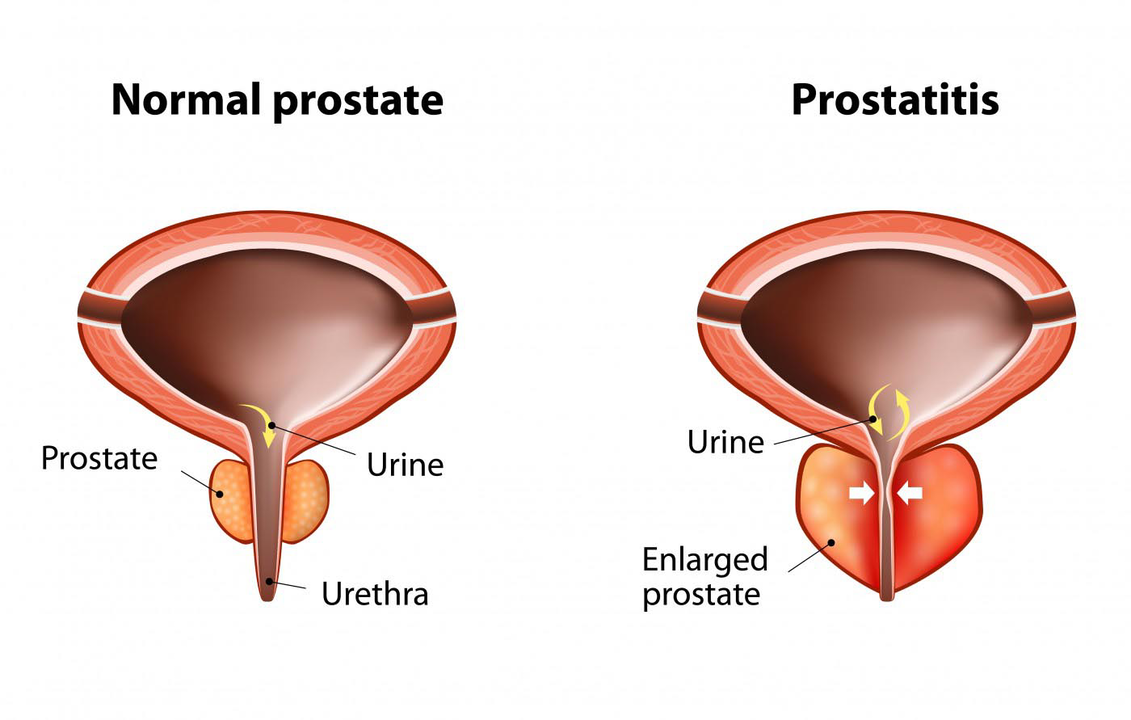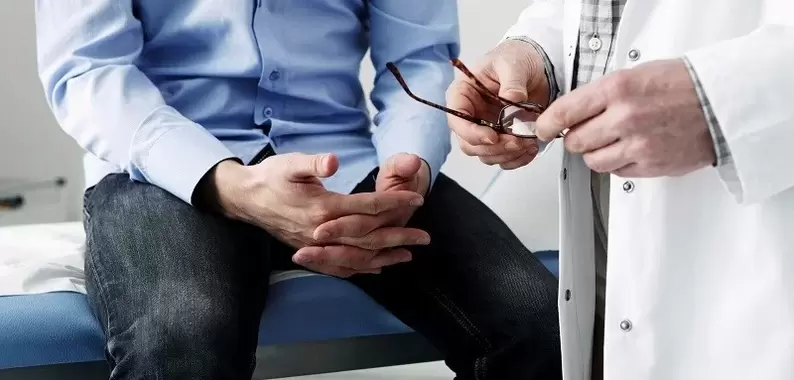Prostatitis is an inflammation of the prostate gland. This is one of the most common diseases in men. Most men over 30 years old are affected. If left untreated, the disease progresses rapidly and leads to serious complications - infertility, impotence and cancer.
Usually, prostatitis is manifested by painful urination, pus and bloody urine, and sexual dysfunction.

The prostate is the organ that produces sperm and regulates urination. It is located below the bladder. Includes three faculties. During ejaculation, the prostate begins to contract, pushing semen through the urinary tract. This gland is involved in reducing urinary incontinence, forming an erection, and producing sperm.
Prostate juice contains large amounts of proteins, fats, enzymes and even some vitamins. Juice dilutes semen, thereby promoting sperm viability. The prostate is an active organ. It depends on the level of hormones and itself participates in the formation of sex hormones.
reason
It is difficult to determine the exact cause of the development of prostatitis in a particular person. Most likely, it will be a complex set of factors that, to one degree or another, have led to the problem.
Let's look at the causes and factors that can contribute to the development of prostatitis:
- Hypothermia and stress. The body's defenses are reduced, contributing to the emergence of inflammatory processes.
- Hormonal imbalance. Sex hormone levels influence prostate activity.
- Sexually transmitted infections and urinary tract infections.
- Various disorders of mechanisms in the body: urination disorders, pelvic congestion. An inactive lifestyle and tight underwear hinder blood circulation in the pelvic area. And problems with urination contribute to irritation of glandular tissue and inflammation of the prostate. Constipation can also be considered a predisposing factor.
- Abstain from prolonged sexual intercourse, interrupted sexual intercourse or artificially prolonging sexual intercourse. This leads to enlargement of the gland and its inflammation.
- Poor nutrition and alcohol abuse.
Prostate infection can occur in 4 ways:
- Descending - enters with the urine stream.
- Ascending - increases along the urethra.
- Lymphogen - along with the flow of lymph.
- Blood sugar - along with blood flow.
Symptoms and signs of prostatitis
Symptoms of prostatitis can vary. According to the nature of the course, there are acute and chronic prostatitis.
Common signs of prostatitis include:
- problems with urination - frequent, intermittent and difficult;
- impaired ability to have an erection;
- burning sensation in groin;
- urine that is cloudy and contains fiber;
- the orgasm is not bright;
- increased fatigue;
- decreased potency;
- depression, anxiety.
Acute prostatitis often begins with an increase in body temperature to 39-40 degrees. The prostate swells, causing difficulty urinating. It's difficult and comes with pain.
During exacerbation of prostatitis, the patient feels pain in the perineum, as well as in the rectum, groin and sacrum.
Acute prostatitis can be inflammation of the prostate, follicles, and parenchyma. Characteristics of acute prostatitis:
- Acute cystic prostatitis is characterized by weak flow pressure during urination. It is accompanied by severe pain, which can radiate to the anal area, especially worse when defecating. Slight increase in temperature is possible.
- Acute parenchymal prostatitis is characterized by sudden, pulsating pain in the perineum. Intoxication of the body is observed, the temperature can reach 40 degrees. Often accompanied by urinary retention.
- Acute catarrhal prostatitis causes perineal pain, frequent urination, and pain during urination.
Chronic prostatitis can develop from an acute form, but more often it immediately develops into a chronic form. Symptoms disappear, there are no clear signs or manifestations.
Symptoms and signs due to chronic prostatitis:
- decreased erection and sexual desire;
- decreased flow pressure during urination;
- cramps and pain when urinating;
- pain in the perineum, anus, and sacrum.
Because the signs of chronic prostatitis are not obvious, patients often do not pay attention to the symptoms for a long time, which makes the disease more serious and can cause complications.
Diagnosis of prostatitis
Medicines do not stand still, diagnosing prostatitis is not difficult. After collecting the history, the doctor may prescribe various diagnostic methods to confirm the diagnosis of prostatitis.
- Palpate the prostate through the rectum to diagnose prostatitis. It will reveal pain and increased size, which are characteristic signs of an inflammatory process in it, and when palpated, the secretions of the prostate will be released and sent for analysis.
- Ultrasound examination.
- Microscopic examination of prostatic secretions.
- Check urine bacteria.
- A stain of mucous membranes and glandular secretions to look for infection.
- Analyze smears from the urethra to identify sexually transmitted diseases that can cause prostatitis.
- Blood test to determine sex hormones.

These diagnostic measures not only help confirm the diagnosis because the symptoms are generally quite pronounced, but also help determine the cause of the disease.
Treatment of prostatitis
Currently, there are many treatments for prostatitis. These include traditional methods and folk medicine methods. Traditional medicine can serve as a supplement to basic therapy. Self-treatment of prostatitis is very dangerous because it can lead to complications.
Doctors always use traditional medical methods of treating prostatitis. This helps reduce swelling, severe inflammation and normalizes prostate activity.
Usually a complex of different methods is prescribed:
- rectal suppositories. Reduces pain and inflammation;
- injection;
- nonsteroidal anti-inflammatory drugs;
- instillation - the drug is injected directly into the prostate;
- bacteria;
- tablets. The most common are antibacterial drugs;
- alpha blockers.
The set of treatment measures is selected individually, depending on the severity of the disease, the manifestation of symptoms and the expected therapeutic effect for the patient.
If a bacterial cause of prostatitis is identified, broad-spectrum antibiotics will be prescribed to kill certain strains of bacteria. They can come in suppository, tablet, and injection form.
Analgesics are used to relieve pain.
Alpha blockers - help relax the urethral muscles, a consequence of prostatitis. To relieve tension in the perineal area, a variety of muscle relaxants are used.
An essential step is to improve blood circulation to reduce congestion and take vitamins.
Various physiotherapy procedures and prostate massage are mandatory for the treatment of prostatitis. Prostate massage is used for all forms and stages of disease development, it helps improve blood circulation and squeeze secretions with pathogenic environments into the urethra.
Some scientists have become skeptical about this method of treating prostatitis, arguing that the pathogenic environment penetrates deeper into the genitourinary system and contributes to inflammation of other organs. Experiments are currently being conducted, this opinion has not been refuted or clinically proven, therefore massage is an indispensable method for treating prostatitis.
Traditional treatment at home
Traditional medicine is often used in the treatment of prostatitis at home. If chronic prostatitis is diagnosed, additional treatment with folk remedies will be very useful. It will not be superfluous in case of acute manifestations of prostatitis, however, only home treatment is unacceptable.
Among the popular methods, the following can be called quite effective:
- Treat prostatitis with pumpkin seeds. Pumpkin seeds contain a large amount of zinc, which is essential for men whether they have prostatitis or not.
- Treatment of prostatitis with parsley - helps reduce inflammation and normalize sexual function. Contains a large amount of vitamins.
- Treat prostatitis with infusion of dracaena and celandine. This method should be used with caution, as these herbs are poisonous and strict adherence to dosage and dosing regimen is required.
- Treat prostatitis with wormwood. Used to reduce inflammation and eliminate purulent infections.
- Treat prostatitis with garlic, dill, hazelnuts, chestnuts, propolis, herbs. . .
Most of these methods are aimed at reducing the inflammatory process and normalizing sexual function. A large number of different vitamins saturate the body, which plays a role in preventing exacerbations of prostatitis.
Consequences of prostatitis
If you refuse and if treatment for prostatitis is not started promptly, there is a high likelihood of developing serious complications. Among the complications:
- dry;
- impotent;
- BPH;
- prostate cancer and others.
If treatment is refused, the infection will penetrate deeper into nearby tissues. Other prostate diseases can also develop, including stones and cysts.
With prostatitis, the level of sex hormones decreases, leading to a decrease in sexual desire (libido). Erectile dysfunction begins and premature ejaculation may occur. Impotence is possible.
Prostatitis also leads to infertility. This problem is especially common in patients with chronic prostatitis. This complication was observed in half of these patients.
Prostatic sclerosis may develop. In this case, the gland partially or completely stops working. This problem is accompanied by severe pain, sexual dysfunction, and urination problems.
Prostate adenoma and prostate cancer are the most dangerous complications of prostatitis.
The problems and complications that prostatitis causes, one way or another, affect men's sex life. This leads to psychological problems, stress and depression.
It is important to carefully monitor the signs to promptly recognize chronic prostatitis.
Prevention of prostatitis
Prevention of exacerbations is aimed at monitoring health and promptly identifying problems. Since in most cases prostatitis is a consequence of untreated diseases of the genitourinary system, great attention should be paid to the treatment of such diseases.
Prostatitis is considered a disease that is easier to prevent than to treat.
Among the prevention methods, the most important are:
- Sports activities. They work to improve blood circulation in the pelvis, prevent the occurrence of blockages and strengthen the pelvic muscles.
- Regular sex life. Drugs that artificially prolong sexual intercourse, interrupt sexual intercourse, and inhibit ejaculation are undesirable.
- Refuse promiscuity. Violent sex life leads to sexually transmitted diseases.
- Proper and healthy nutrition.
- Stop drinking wine.
- Strengthens the body's defenses and prevents hypothermia.
- Minimize stress.
Prostatitis has a low rate of self-healing or home treatment. Therefore, at the first signs, you should immediately contact a urologist to receive full treatment. You also need to carefully monitor signs indicating chronic prostatitis and promptly consult a doctor.































